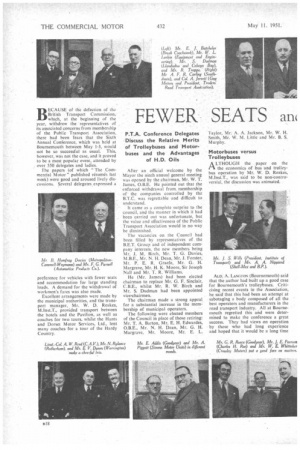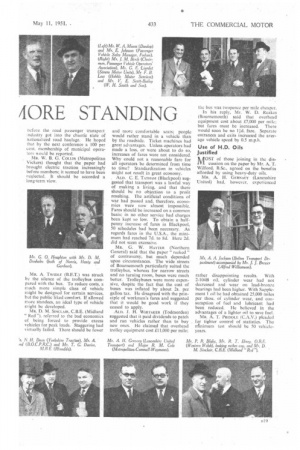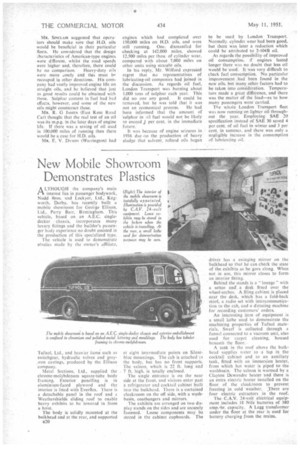FEWER
Page 52

Page 53

Page 54

If you've noticed an error in this article please click here to report it so we can fix it.
SEATS an
40RE STANDING
P.T.A. Conference Delegates Discuss the Relative Merits of Trolleybuses and Motorbuses and the Advantages of M.D. Oils
BECAUSE of the defection of th.: British Transport Commission, which, at the beginning of the year, withdrew the representatives of its associated concerns from membership of the Public Transport Association, there had been fears that the Sixth Annual Conference, which was held at Bournemouth between May 1-3, would not be so successful as usual. This, however, was not the case, and it proved to be a most popular event, attended by over 550 delegates and ladies.
The papers (of which "The Commercial Motor" published resumes last week) were good and aroused lively discussions. Several delegates, expressed a
preference for vehicles with fewer seats and accommodation for large standing loads. A demand for the withdrawal of workmen's fares was also made.
Excellent arrangements were made by the municipal authorities, and the transport manager, Mr. W. D. Reakes, M.Inst.T., provided transport between the hotels and the Pavilion, as well as coaches for two tours, whilst the Hants and Dorset Motor Services, Ltd., lent many coaches for a tour of the Hardy Country. After an official welcome by the Mayor the ninth annual general meeting was opened by the chairman, Mr. W. T. James, O.H.E. He pointed out that the enforced withdrawal from, membership of• the companies controlled by the B.T.C. was regrettable and difficult to understand.
It came as a complete surprise to the council, and the manner in which it had been carried out was unfortunate, but the value and effectiveness of the Public Transport Association would in no way be diminished.
The vacancies on the Council had been filled by representatives of the B.E.T. Group and of independent company interests, the new members being Mr. J. M. Birch, Mr. T. G. Davies, KRT.., Mr. N. H. Dean, Mr. J. Forster, Mr. P. E. R. Graefe, Mr. G. H. Margrave, Mr. H. K. Moore, Sir Joseph Nall and Mr. I, R. Williams.
He (Mr. James) had been elected chairman to replace Mr. G. F. Sinclair, C.B.E., whilst Mr. R. W. Birch and Mr. S. Dudman had been appointed vice-chairmen.
The chairman made a strong appeal for a substantial increase in the membership of municipal operators.
The following were elected members of the Council in place of those retiring: Mr. T. A. Barton. Mr. E. H. Edwardes, 0.B.E., Mr. N. H. Dean, Mr. G. H. Margrave. Mr. Moore, Mr. E. L. Taylor, Mr. A. A. Jackson, Mr. W. H. Smith, Mr. W. M. Little and Mr. B. S. Murphy.
Motorbuses versus Trolleybuses
A LTHOUGII the paper on the CA the economics of bus and trolleybus operation by Mr. W. D. Reakes, Minst.T., was said to be non-controversial, the discussion was animated.
ALD. A. LANCTON (Bournemouth) said that the author had built up a good case for Bournemouth's trolleybuses. Criticising recent events in the Association, he said that this had been an attempt at sabotaging a body composed of all the best operators and manufacturers in the road transport industry. All at Bournemouth regretted this and were determined to make the conference a great success. They had views on operation by those who had long experience and hoped that it would be a long time
before the road passenger transport industry got into the chaotic state of nationalized road haulage. He hoped that by the next conference a 100 per cent, membership of municipal operators would be reported.
MR. W. B. C. Cows (Metropolitan Vickers) thought that the paper had brought electric traction increasingly before members; it seemed to have been neglected. It should be accorded a long-term view.
Ma. A. TWIDLE (B.E.T.) was struck by the silence of the trolleybus compared with the bus. To reduce costs, a much more simple class of vehicle might be designed for certain services, but the public liked comfort. If allowed more standees, an ideal type of vehicle might be developed.
MR. D. M. SINCLAIR, C.B.E. (Midland " Red "), referred to the bad economics of being forced to provide excess vehicles for peak loads. Staggering had virtually failed. 'there should be fewer
and more comfortable seats; people would rather stand in a vehicle than by the roadside. Ticket machines had great advantages. Unless operators had made a loss, or were about to do so, increases of fares were not considered. Why could not a reasonable fare for all operators be determined from time to time? Standardization in vehicles might not result in great economy.
. ALD. C. E. TATHAM (Blackpool) suggested that transport was a lawful way of making a living, and that there should be no objection to a profit resulting. The artificial conditions of war had passed and, therefore, econo mies were now almost impossible. Fares should be increased on a common basis; in no other service had charges been kept so low. To obtain a halfpenny increase of fares in Blackpool, 50 schedules had been necessary. As regards fares in the U.S.A., the minimum had reached 7d. to 8d. Here 2d, slid not seem excessive.
Ma.. G. W. HAyrEst (Northern General) said that the paper " reeked " of controversy, but much depended upon circumstances. The wide streets' of Bournemouth particularly suited the trolleybus, whereas for narrow streets and no turning room, buses were much better. Trolleybuses were more expen sive, despite the fact that the. cost of buses was inflated by about 2s. per gallon tax. Ile disagreed with the prin ciple of workmen's fares and suggested that it would be good work if they ceased to apply.
Arm. J. H. WHITAKER (Todmorden) suggested that it paid dividends to patch and run vehicles rather than to buy . new ones. He claimed that overhead trolley equipment cost £11,000 per mile; the bus was twopence per mile cheaper.
In his reply, Mr. W. D. Reakes (Bournemouth) said that overhead equipment cost about £7,000 per mile; but fares must be increased. There would soon be no lid, fare. Separate entrances and exits increased the average vehicle speed by 0.5 m.p.h.
Use of H.D. Oils Justified
MOST of those joining in the discussion on the paper by Mr. A. T. Wilford, B.Sc., agreed on the benefits afforded by using heavy-duty oils.
MR. A. If. GERNAEY (Lancashire United) had, however, experienced rather disappointing results. With 2-1048 oil, cylinder wear had not decreased and wear on lead-bronze bearings had been higher. With Supplement I oil he had obtained 25,000 miles per thou, of cylinder wear, and consumption of fuel and lubricant had been reduced. Ile believed in the advantages of a lighter oil to save fuel.
MR. A. T. PRIDDLE (C.A.V.) pleaded for tighter control of statistics. The rrhimum test should be 50 vehicleyears.
MR. SINCLAIR suggested that operators should make sure that H.D. oils would be beneficial in their particular fleets. He considered that the design characteristics of American-type engines were different, whilst the road speeds were higher and, therefore, there could
be no comparison. Heavy-duty oils were more costly and this must be recouped in other directions. His corns pony had vastly improved engine life on straight oils, and he believed that just as good results could be obtained with these. Sulphur content in 'fuel had had effects, however, and some of the new oils might counteract these.
MR. R. G laws (East Kent Road Car) thought that the real test of an oil was its m.p.g. in the latex days of engine life. If there was a saving of oil used in 100.000 miles of running then there would be a case for H.D. oils.
MR. E. V. D1SON (Wm ringion) had
engines which had completed over 150,000 miles on H.D. oils, and were still running. One, dismantled for checking at 142,000 miles, showed 12.500 miles per thou. of cylinder wear, compared with about 7,000 miles on other units using straight oils.
In his reply.: Mr. Wilford expressed regret that no representatives of lubricating-oil companies had joined in the discussion. As regards oil fuel, London Transport was burning about 1.000 tons of sulphur each year. This did no one any good. It could be removed, but he was told that it was
not an economical process. He had been informed that the amount of *sulphur in ail fuel would not be likely to exceed J per cent. in the immediate f tit tire.'
It was because of engine seizures in 1936 due -to the production of heavy sludge that solvent; refined oils began
to be used by London Transport. Normally. cylinder wear had been good, but there was later a reduction which could be attributed to 2-104B oil.
As regards the possibility of improved oil consumption, if engines lasted longer there was no doubt that less oil would be used. It was very difficult to check fuel consumption. 'No particular improvement had been found in the new oils, but many other factors had to be taken into consideration. Temperature made a great difference, and there was the matter of the load—as to how many passengers were carried.
The whole London Transport fleet was now running on lighter oil throughout the year. Employing SAE 20 specification instead of SAE 30 saved 4 per cent, of oil fuel in winter and 3 per cent. in summer, and there was only a negligible increase in the consumption of lubricating oil.




























































































